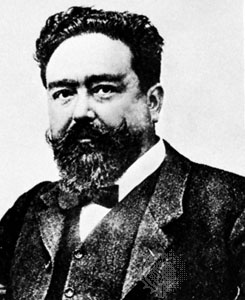Albéniz, Isaac
Spanish composer
born May 29, 1860, Camprodón, Spain
died May 18, 1909, Cambo-les-Bains, France
 composer and virtuoso pianist, a leader of the Spanish nationalist school of musicians.
composer and virtuoso pianist, a leader of the Spanish nationalist school of musicians.Albéniz appeared as a piano prodigy at age 4 and by 12 had run away from home twice. Both times he supported himself by concert tours, eventually gaining his father's consent to his wanderings. He studied at the Leipzig Conservatory in 1875–76 and, when his money ran out, obtained a scholarship to study in Brussels. From 1883 he taught in Barcelona and Madrid. He had previously composed facile salon music for piano, but about 1890 he began to take composition seriously. He studied with Felipe Pedrell (Pedrell, Felipe), father of the nationalist movement in Spanish music, and in 1893 moved to Paris. There he came under the influence of Vincent d'Indy, Paul Dukas, and other French composers and for a time taught piano at the Schola Cantorum. He later developed Bright's disease and was a near invalid for several years before he died.
Albéniz' fame rests chiefly on his piano pieces, which utilize the melodic styles, rhythms, and harmonies of Spanish folk music. The most notable work is Iberia (1905–09), a collection of 12 virtuoso piano pieces, considered by many to be a profound evocation of the spirit of Spain, particularly of Andalusia. Also among his best works are the Suite española, containing the popular “Sevillana”; the Cantos de España, which includes “Córdoba”; Navarra; and the Tango in D Major. Orchestrated versions of many of his pieces are also frequently played.
- Naḥḥās Pasha, Muṣṭafā al-
- Naṣr ibn Sayyār
- Naṣrid dynasty
- Naṣr Ḥāmid Abū Zayd
- Naṣīr al-Dīn al- Ṭūsī
- Naẓẓām, Ibrāhīm an-
- NBC Symphony
- NCR Corporation
- Ndabaningi Sithole
- Ndebele
- N'Djamena
- Ndola
- Ndongo
- Ndutu
- Neagh, Lough
- Neagle, Dame Anna
- Neal Dow
- Neale, Earle
- Neal E. Miller
- Neal, Patricia
- Neamţ
- Neanderthal
- Neapolitan opera
- neap tide
- Nearchus